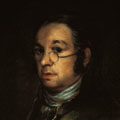Not until the year of Gainsborough's death, 1788, was there born another landscape painter. This was John Crome, and he too came from the east of England, nearest to Holland, being born in Norfolk, the neighbouring county to Gainsborough's native Suffolk. Within ten years more, two still greater landscapists were born, also in the east, Constable in Essex, still closer to Sudbury, and Turner in London.








